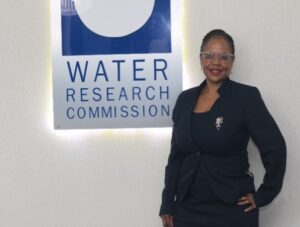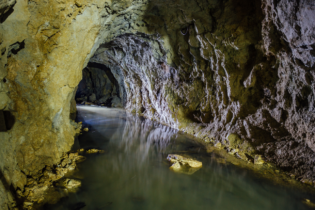Dr Jennifer Molwantwa’s first interaction with the Water Research Commission (WRC) was in the 1990s as a Rhodes University student working on a WRC-funded project within the university’s Environmental Biotechnology Research Unit. Today, she is the first black woman to head the WRC.
With a PhD in Biotechnology, majoring in mine-water treatment, Molwantwa is a registered professional natural scientist with the South African National Council for Scientific Professions. She has been an active member of WISA since 2004, as well as the recipient of the WISA Mine Water Division Best Paper Presented by a Student (2004) and the Excellence in Research Award for a Young Scientist (2006). Jennifer was also instrumental in the establishment of the WISA YWP network in 2006. Her career started at Pulles Howard & de Lange (later incorporated into Golder Associates Africa) as a research assistant and then water resource consultant, before joining Digby Wells Environmental as a unit manager. She joined the WRC in 2014 as a research manager responsible for water resource quality prior to being appointed executive: Water Resource Management at the Inkomati-Usuthu Catchment Management Agency, where she served for five years (2016 to 2022). Molwantwa has previously also served on the Council of the University of KwaZulu-Natal where she also represented Council on Senate. She currently serves on the boards of the Water Institute of Southern Africa (WISA) and the Environmental Assessment Practitioners Association of South Africa, and is a member of the Department of Fisheries Forestry and Environment subcommittee for the development of the National Implementation Plan for chemicals management. One of her biggest career highlights happened in 2010 when she was selected as one of the 26 commissioners to serve on the National Planning Commission headed by then Minister in the Presidency. This part-time position entailed planning for the future of South Africa for the next 20 years, where the Vision 2030 for the country and the National Development Plan were developed. Plans for the future “The WRC will continue on its path of excellence, and we plan to take it to even greater heights. I will focus on increasing the relevance and responsiveness of the WRC to the needs of people with no access to water and sanitation. We will continue to address the length and breadth of issues within the water and sanitation sector, and embrace innovation and technology that is fit for purpose. The uptake of research innovation and technology by the water sector and government is our primary focus in the short to medium term. It is important that the WRC remains a relevant body that adds value to this sector and uses all funding as efficiently as possible. Levy payers should feel the benefit of their investment in the WRC, and all spheres of government – particularly through the District Development Model – should benefit from our research. The WRC will continue to focus on supporting the Department of Water and Sanitation (DWS) in addressing challenges within the sector,” says Molwantwa.Applied research is vitally important to the WRC, and several technology transfer demonstrations have been implemented. There is a memorandum of understanding between the Department of Science and Innovation (DSI) and the WRC, whereby many technology assessments in the water space are funded by the DSI and are successfully brought to the South African market once they pass the demonstration phase. This is the space where the entrepreneurial support for water sector innovation and technology is evident.
“There is a host of ongoing WRC projects that I am excited about – ranging from dam siltation management, hydropower and water efficiency in the agricultural sector, to low-flush sanitation, non-revenue water, climate change adaptation from a water perspective and riverine management, to name a few,” states Molwantwa. “We have to support government in an integrated approach to disaster management through early warning systems in collaboration with the South African Weather Service, and ministries like CoGTA and the DWS. The three key disasters that require our serious leadership and attention include floods/droughts, water/food security, and water pollution.” According to Molwantwa, research is a competitive space, and there is always a possibility that research can be duplicated by two different institutions. “There needs to be an assessment of the status quo of water research in South Africa, following which resources can be pooled and research gaps identified. We do not always have to reinvent the wheel. “Research is about finding solutions and having a futuristic attitude. We need to build capacity in schools and cultivate talent in young students. There are many young women working within the water research space, and this is encouraging in a democracy as young as South Africa. However, we must be consciously intentional about creating more pools of women to lead in science and technology,” she adds. Molwantwa’s wish for the water sector “I believe that there should be an act that legislates water from source to tap and treats water as the precious resource it is. While it is a human need and right, the population must be educated on its finality, the true cost of access and the respect that must be given in terms of quality and quantity. When I was a child visiting my grandmother’s house, water had to be collected at a communal borehole. Food could not be cooked, and clothes and bodies could not be washed unless a container of water was collected at the borehole. Water was treasured by everyone living there. I would like everyone to value water; there needs to be an emphasis on educating communities on water, starting with the scholars. The term ‘wastewater’ should be abolished,” she concludes.






